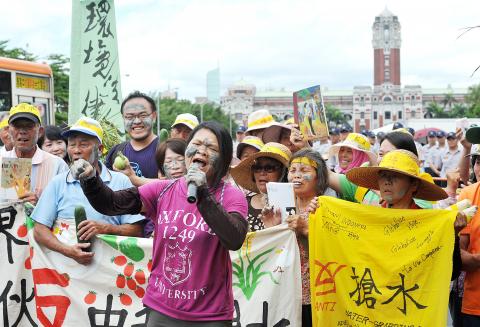Brandishing rice stems, guavas, cucumbers and other crops, close to 100 farmers from Changhua County yesterday gathered on Ketagalan Boulevard in Taipei to protest against a water diversion construction project in the fourth-phase expansion of the Central Taiwan Science Park.
“The science park is robbing us of water. Stop the construction at once,” the farmers shouted.
“We cannot stand the increase in electricity prices. We are very hungry,” they said, adding that as irrigation water is diverted from farmers to supply the science park, farmers would face even more difficult conditions.

Photo: Chien Jung-fong, Taipei Times
“We are not against the science park per se. We are against the water being stolen from us,” farmers from the county’s Sijhou Township (溪洲) said.
“How are we farmers supposed to survive if the science park steals our irrigation water?” they said.
Some artists and writers also joined the farmers to express their support, including folk singer Chen Ming-chang (陳明章) and writers Chu Tien-hsin (朱天心) and Wu Yin-ning (吳音寧).
“Sorry we are a little late, but I believe you [farmers] will not have to fight alone anymore,” Chu said, adding that even the Water Resources Agency knows it is inappropriate to divert agricultural-use water for industrial usage.
It did not make sense for the National Science Council to continue insisting on taking water from farmers, Chu said.
Wu said irrigation water in the nearby towns has been insufficient for more than 10 years, so the decisionmakers in government should stop bullying farmers and undervaluing the importance of water to farming, and refrain from robbing them of water.
A self-help association against the construction project said more than 100 artists and writers had signed a petition in just a few days in support of stopping the water supply diversion at the science park.
The association also urged the government to halt construction at the park and to re-evaluate the country’s agricultural policies to protect farmland and water resources.

Alain Robert, known as the "French Spider-Man," praised Alex Honnold as exceptionally well-prepared after the US climber completed a free solo ascent of Taipei 101 yesterday. Robert said Honnold's ascent of the 508m-tall skyscraper in just more than one-and-a-half hours without using safety ropes or equipment was a remarkable achievement. "This is my life," he said in an interview conducted in French, adding that he liked the feeling of being "on the edge of danger." The 63-year-old Frenchman climbed Taipei 101 using ropes in December 2004, taking about four hours to reach the top. On a one-to-10 scale of difficulty, Robert said Taipei 101

Nipah virus infection is to be officially listed as a category 5 notifiable infectious disease in Taiwan in March, while clinical treatment guidelines are being formulated, the Centers for Disease Control (CDC) said yesterday. With Nipah infections being reported in other countries and considering its relatively high fatality rate, the centers on Jan. 16 announced that it would be listed as a notifiable infectious disease to bolster the nation’s systematic early warning system and increase public awareness, the CDC said. Bangladesh reported four fatal cases last year in separate districts, with three linked to raw date palm sap consumption, CDC Epidemic Intelligence

US climber Alex Honnold left Taiwan this morning a day after completing a free-solo ascent of Taipei 101, a feat that drew cheers from onlookers and gained widespread international attention. Honnold yesterday scaled the 101-story skyscraper without a rope or safety harness. The climb — the highest urban free-solo ascent ever attempted — took just more than 90 minutes and was streamed live on Netflix. It was covered by major international news outlets including CNN, the New York Times, the Guardian and the Wall Street Journal. As Honnold prepared to leave Taiwan today, he attracted a crowd when he and his wife, Sanni,

Taiwanese and US defense groups are collaborating to introduce deployable, semi-autonomous manufacturing systems for drones and components in a boost to the nation’s supply chain resilience. Taiwan’s G-Tech Optroelectronics Corp subsidiary GTOC and the US’ Aerkomm Inc on Friday announced an agreement with fellow US-based Firestorm Lab to adopt the latter’s xCell, a technology featuring 3D printers fitted in 6.1m container units. The systems enable aerial platforms and parts to be produced in high volumes from dispersed nodes capable of rapid redeployment, to minimize the risk of enemy strikes and to meet field requirements, they said. Firestorm chief technology officer Ian Muceus said